1
You may have heart disease.
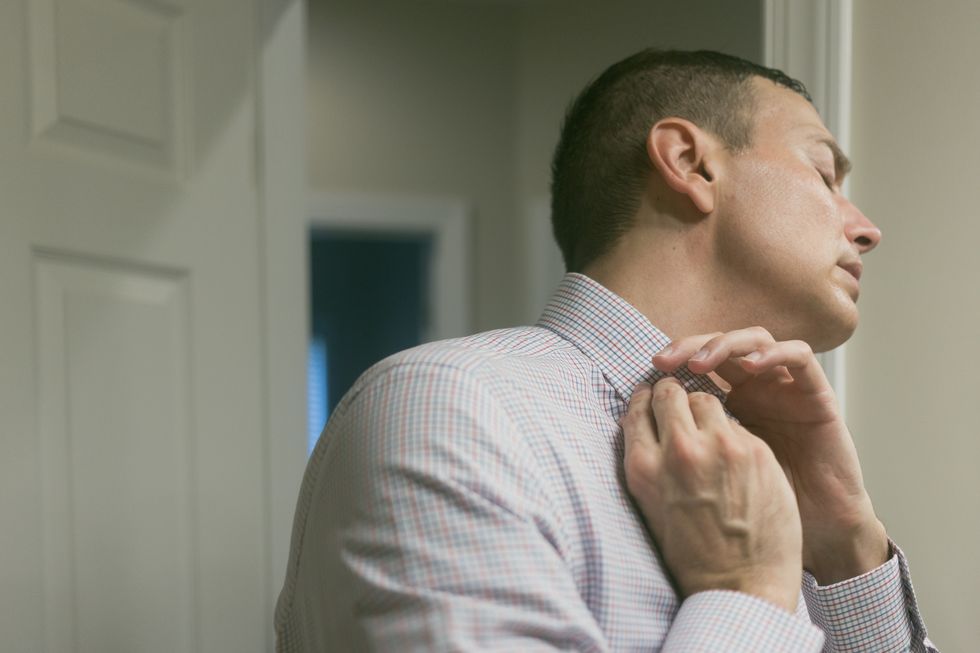
FEELING HOT AND SWEATY could be an important warning sign of heart disease, especially if it’s sudden or comes with other symptoms, like chest discomfort, heart palpitations, shortness of breath or dizziness, says Sergiu Darabant, M.D., a cardiologist at the Miami Cardiac & Vascular Institute, part of Baptist Health South Florida.
“Cardiovascular stress may trigger the autonomic nervous system,” which can release adrenaline, resulting in overheating and sweating, he says. This can occur with some heart conditions.
The combo of sweating, intense body heat, and discomfort is known as “diaphoresis,” Dr. Darabant says. “Diaphoresis may be indicative of myocardial infarction, heart failure, or very high blood pressure.”
Sweatiness may also indicate heart failure: one study showed that many people with heart failure don’t experience traditional heart attack symptoms and instead have major sweating.
If you have risk factors for heart disease, such as high blood pressure or diabetes or you’re a smoker, be vigilant if you experience frequent, unexplained sweating, Dr. Darabant adds. Chest pain and shortness of breath also shouldn’t be ignored.
2
You have a sweating disorder.

POURING SWEAT AT rest in a cool room? You could have hyperhidrosis, an excessive sweating disorder.
“People with hyperhidrosis sweat without the need to cool the body down,” says Melissa Kanchanapoomi Levin, M.D., a New York City-based dermatologist and founder of Entière Dermatology.
While hyperhidrosis sometimes runs in families or signals an underlying health issue (an infection, heart problem, overactive thyroid, or even cancer), it may also be caused by overactive nerves, signaling your body to sweat more.
If you have it, you may sweat through clothes, notice sweat drip off your fingertips, or have beads of sweat running down your face. If this sounds familiar, switch from a deodorant to an antiperspirant, suggests Dr. Levin. You can actually rub antiperspirant on your feet or hands, too, she says. Still sweating? Make an appointment with your dermatologist to see what’s going on. You might benefit from a prescription-strength antiperspirant. Sometimes, doctors may recommend other meds or even surgery.
Advertisement – Continue Reading Below
3
Your thyroid is out of whack.
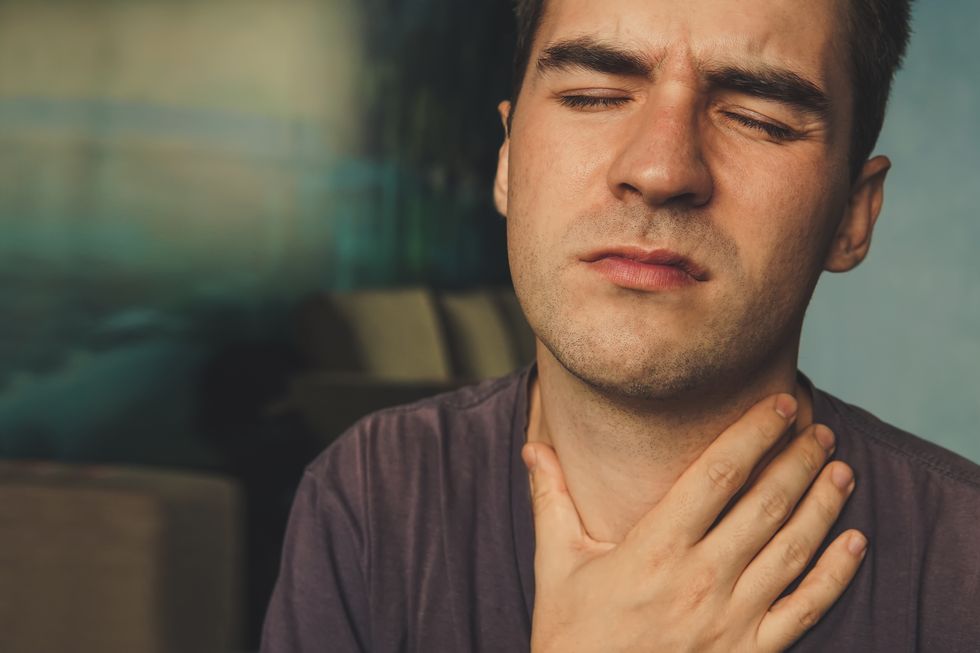
IF YOU’RE HOT and sweaty and you straight-up cannot stand the heat, you may have an overactive thyroid, or hyperthyroidism.
“One of the most common symptoms of hyperthyroidism is heat intolerance,” says internist Jonathan Arend, M.D. “Your thyroid, which regulates metabolism, is overactive and churning through your body’s machinery, running on overdrive like an overheating machine.”
Higher levels of thyroid hormones mean increased energy production, higher body temperature, and lots of sweat, adds David Weissman, M.D., a primary care physician.
Other signs of an overactive thyroid include rapid heart rate, irregular heart rhythm, elevated blood pressure, and unexplained weight loss, he says. The good news: Hyperthyroidism can be treated with medication and sometimes surgery.
4
You’re super fit — or working on it.

SWEAT CAN BE a sign of peak fitness or a commitment to shaping up.
“People who are more fit tend to start sweating sooner into their exercise regimen because they have adapted to be more efficient at maintaining a lower body temperature while exercising,” explains Dr. Weissman.
Out of shape and notice you’re dripping in sweat? While fit men tend to sweat faster than couch potatoes, guys who are overweight have more insulation, which means they generate more heat and may sweat more throughout a workout, too, says Dr. Weissman.
Advertisement – Continue Reading Below
5
You have a fever.

HOT, SWEATY, FLUSHED, and feel like crap? Break out the thermometer: If your temp’s higher than 100.4 degrees Fahrenheit, you have a fever. It’s your body’s way of trying to mount a defense against whatever’s causing your illness (likely a virus or bacteria).
Sometimes a fever is just related to a cold; sometimes, however, it’s a symptom of the flu or Covid (here’s more on the difference between the flu and Covid). Other times, it could signal something more serious, such as tuberculosis, a bacterial infection, or lupus, Arend says. If your fever persists, see your doctor.
6
Your meds are to blame.

COMMON MEDICATIONS SUCH as oral decongestants (such as pseudoephedrine), erectile dysfunction meds (Viagra and Cialis), and even some antidepressants could have one side effect in common: excess sweating.
That doesn’t mean you should stop taking them, but it could warrant a conversation with your doctor to see if there are other options that won’t make you break a sweat.
Certain men who are being treated for prostate cancer may require medications to rapidly drop testosterone levels. “Men on such treatment frequently report hot flashes,” says Dr. Mohan.
This handy list from the International Hyperhidrosis Society pinpoints some of the biggest medication offenders.
Advertisement – Continue Reading Below
7
You have hypoglycemia.
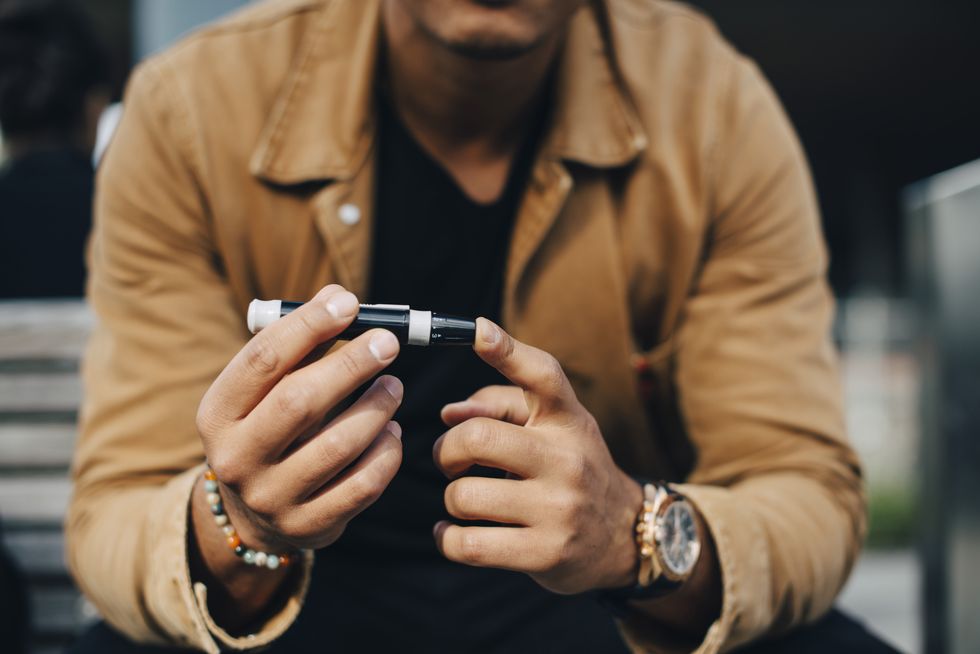
IF YOU HAVE diabetes and feel jittery, lightheaded, and sweaty, you may be experiencing hypoglycemia, or a drop in blood sugar levels, Dr. Arend says. As your body tries to deal with the stress of this situation, your sweat glands go into overdrive—hence more sweat, even if you don’t feel super hot.
In the short-term, glucose tablets or drinking some fruit juice can help raise blood sugar levels. But untreated diabetic hypoglycemia can trigger seizures and even loss of consciousness, so if you have symptoms several times a week, see your doc, says Dr. Weissman.
8
You’re anxious.

BEING SUPER-SWEATY before a first date or important interview could be your body’s response to stress and anxiety.
“Increased anxiety causes a rise in heart rate, blood pressure, and respiratory rate, and ultimately, increased body temperature,” explains Dr. Weissman. “As your body heats up, you’ll automatically sweat more.”
If you have generalized anxiety disorder (GAD), you might also notice you have trouble sleeping, you’re tense and achy (your back and neck are always killing you), or you’re super irritable (read: you’re always on the edge of blowing up at someone). Simple stress reduction techniques (like this simple meditation plan and yoga) can quell anxiety, says Dr. Weissman. But it’s best to loop in an expert, like a counselor or therapist, for added insight.
Advertisement – Continue Reading Below
9
You’ve been drinking alcohol or caffeine.

CONSUMING ALCOHOL OR caffeine can temporarily increase your heart rate, which explains that jittery feeling, and dilate blood vessels, which explains the warmth. These can cause an increase in body temperature and make you feel hot and sweaty, Dr. Weiner says.
Laying off these beverages or limiting your intake may remedy your consistent body temperature increases. If not, get checked out.
10
It could be a sign of cancer.
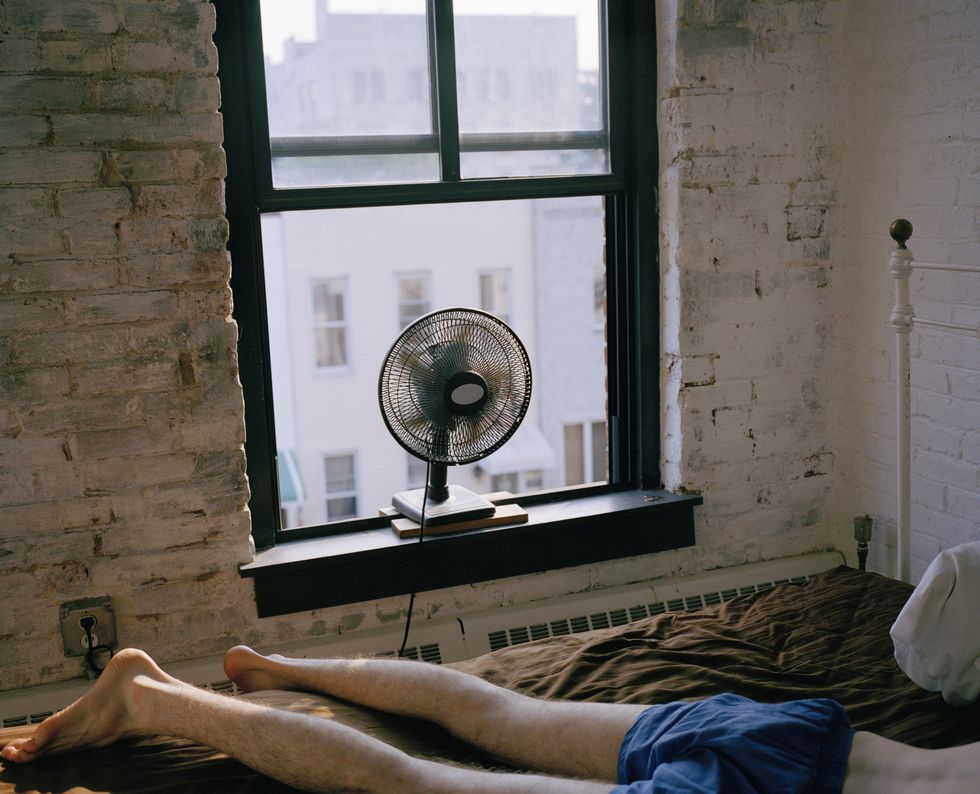
NIGHT SWEATS CAN be common—anxiety, stress, and sleep problems can cause them in healthy men. But in rare cases, they could be a sign of cancers such as lymphoma, leukemia, kidney, or thyroid cancer.
Just as your body heats up when it fights an infection, your immune system ramps up to tackle other threats including cancer, Dr. Arend explains.
If you notice night sweats are becoming a regular occurrence (even if you keep your bedroom cool) and they come with other symptoms (unexplained weight loss or fever), make an appointment with your doc.
A rare endocrine tumor responsible for heat intolerance is pheochromocytoma, which is a catecholamine or “adrenaline” secreting tumor. It can produce episodic symptoms that resemble your “fight or flight” response, Dr. Mohan says.
Feeling hot all the time could be from carcinoid syndrome, a disease caused by some neuroendocrine tumors that typically arise in the gastrointestinal tract, adds Dr. Mohan. These can also come with symptoms such as flushing of the face, watery diarrhea, wheezing, or shortness of breath when these tumors liberate serotonin and other substances into your system. If you feel you’re hot all the time and have additional symptoms that you don’t usually experience, definitely see a doctor.
Advertisement – Continue Reading Below
11
It could just be your metabolic rate.
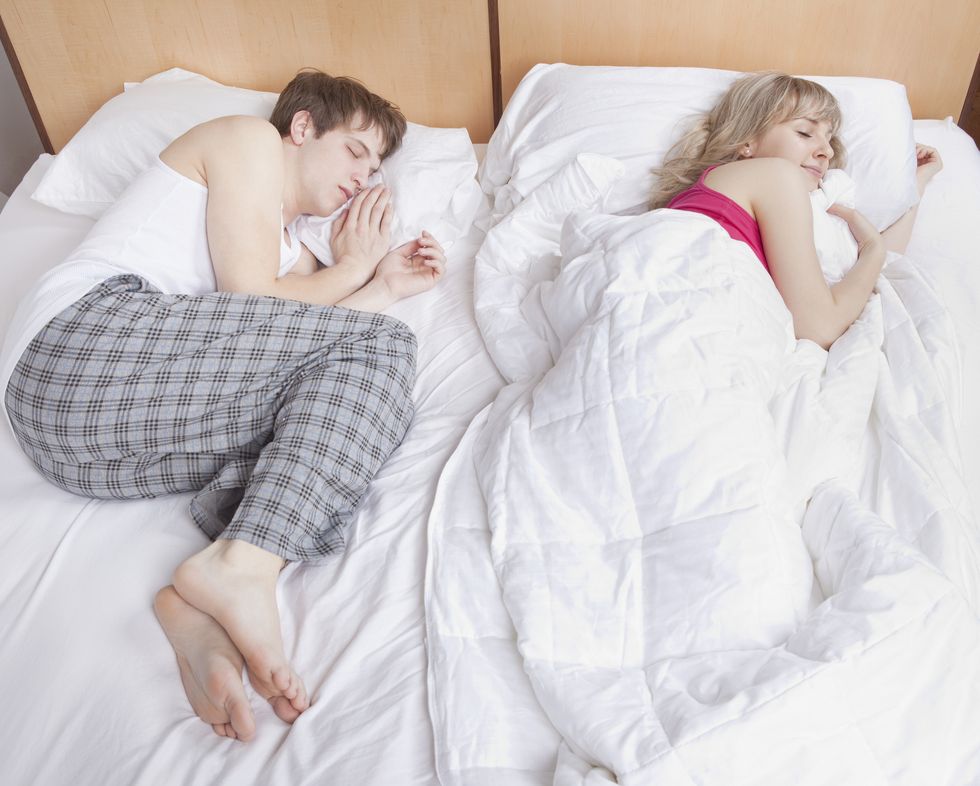
INDIVIDUALS HAVE VARYING metabolic rates, which can influence how their bodies generate and dissipate heat, Dr. Weiner says. “Some people naturally run warmer than others.”
If you’re sweating while others around you, especially women, are shivering, it’s likely due to your higher metabolic rate—men’s rates tend to be higher than women’s, according to the American Osteopathic Association.
12
You may be experiencing inflammation or an allergic reaction.
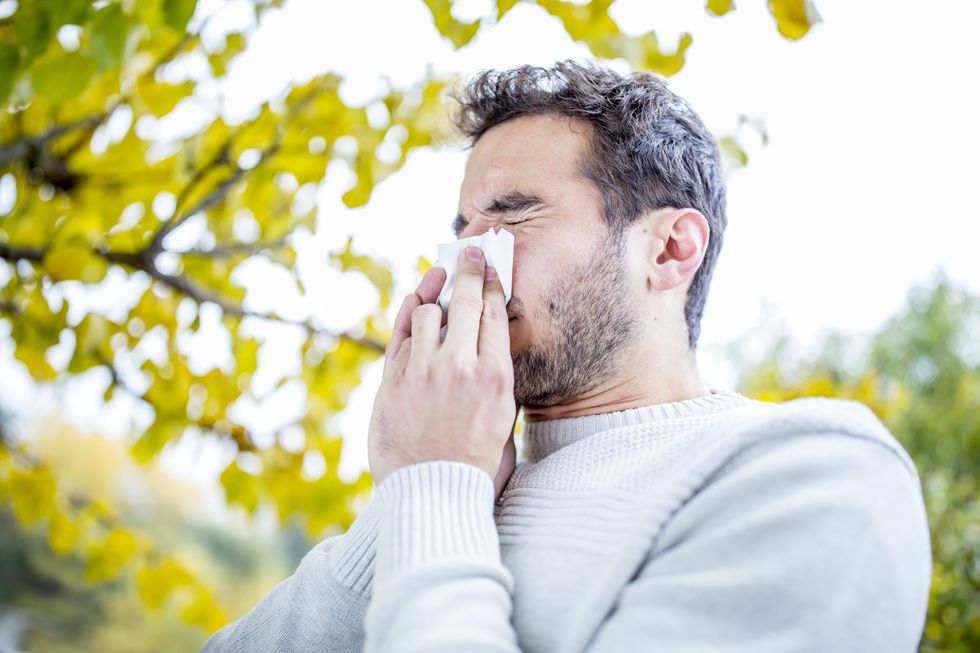
INFLAMMATORY PROCESSES OR allergic reactions can cause the body to release chemicals that lead to increased blood flow and higher body temperatures, Dr. Weiner says.
If you have any known allergies, make sure you haven’t come into contact with their causes and keep an eye out for other telltale symptoms like hives, itching and itchy or swollen eyes.
And, if you notice these symptoms coming up for the first time, talk to a doctor—allergies can actually develop at any point in your life.
Advertisement – Continue Reading Below
13
When to Worry

If you’re not hot-natured but suddenly seem to feel warm and sweaty all the time, it could be a sign that something is changing in your body. And it doesn’t hurt to check in with your doctor about it.
“Men should consider consulting a doctor if they experience frequent, unexplained episodes of feeling hot or sweating, particularly at rest, in cool environments, or during sleep,” Dr. Darabant says.
Seek immediate medical attention if your body temperature shifts come with other symptoms, like chest discomfort, shortness of breath, lightheadedness, heart palpitations, or anything else out of the ordinary, he emphasizes. These could be a sign of a heart attack or another medical problem.
Note: This article have been indexed to our site. We do not claim legitimacy, ownership or copyright of any of the content above. To see the article at original source Click Here












